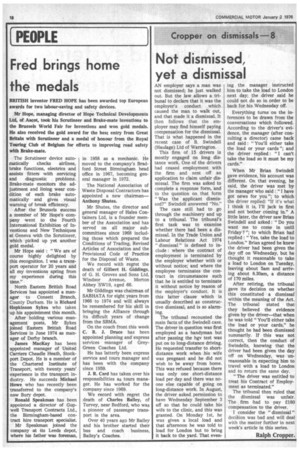Not dismissed, yet a dismissal
Page 20

If you've noticed an error in this article please click here to report it so we can fix it.
AN employer says a man was not dismissed; he just walked out. But the law allows a tribunal to declare that it was the employer's conduct which caused the man to walk out, and that made it a dismissal. It then follows that the employer may find himself paying compensation for the dismissal. That is what happened in the recent case of B. Swindell (Haulage) Ltd of Warrington.
This firm of 15 drivers is mostly engaged on long distance work. One of the drivers had ceased employment with the firm and sent off an application to claim unfair dismissal. The firm was asked to complete a response form, and to the question on that form "Was the applicant dismissed?" Swindell answered "No."
The case still had to go through the machinery and up to a tribunal. The tribunal's first task was to examine whether there had been a dismissal. In the Trade Union and Labour Relations Act 1974 " dismissal " is defined to include; where the contract of employment is terminated by the employer whether with or without notice; and where the employee terminates the contract in circumstances such that he is entitled to terminate it without notice by reason of the employer's conduct. It is this latter clause which is usually described as constructive dismissal, and is so alarming.
The tribunal recounted the main facts of the Swindell case. The driver in question was first employed as a handyman but after passing the hgv test was put on to long-distance driving. He requested transfer to shortdistance work when his wife was pregnant and he did not wish to be away from home. This was refused because there was only one short-distance load per day and there was noone else capable of going on long-distance work. In August, the driver asked permission to have Wednesday September 3 off so that he could take his wife to the clinic, and this was granted. On Monday 1st, he was given a local load and that afternoon he was told to load for London but to bring it back to the yard. That even ing the manager instructed him to take the load to London next day; the driver said he could not do so in order to be back for his Wednesday off.
Everything turns on the inferences to be drawn from the conversations which followed. According to the driver's evidence, the manager (after consulting a director) came back and said : "You'll either take the load or your cards "; and the driver replied : "I can't take the load so it must be my cards."
When Mr Brian Swindell gave evidence, his account was different. On that evening, he said, the driver was met by the manager who said :." I have got news for you "; to which the driver replied: "If it's what I think it is, I'll jack in first and not bother coming in." A little later, the driver saw Brian Swindell and asked : "Do you want me to come in until Friday ? "; to which Brian had replied : "Yes, take the load to London." Brian agreed he knew the driver had been given the day off on Wednesday, but he thought it reasonable to take a load to London on Tuesday, leaving about 5am and arriving about 8.30arn, a distance of 170 miles.
After retiring, the tribunal gave its decision on whether this constituted a dismissal' within the meaning of the Act. The tribunal stated that they believed the evidence given by the driver—that when he was told "You'll either take the load or your cards," he thought he had been dismissed summarily. If this was not correct, then the conduct of Swindells, knowing that the driver had been given the day off on Wednesday, was unreasonable in expecting him to travel with a load to London and to return the same day.
"The driver was entitled to treat his Contract of Employment as terminated."
The tribunal then ruled that the dismissal was unfair. The, firm had to pay E180 compensation to the driver.
I consider the " dismissal " deciSion was bad and will deal with the matter further in next week's article in this series.




































































